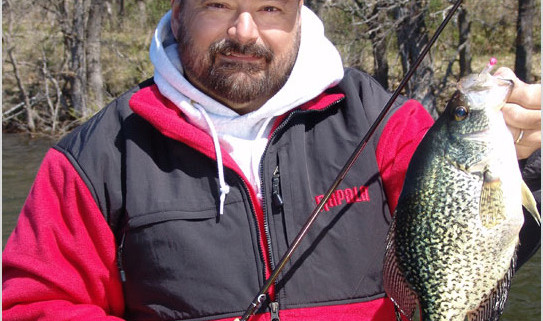Calling All Volunteers… Join the team
A strong volunteer base is the core strength of LGF. Volunteers contribute time and expertise to help create memories for program participants. All LGF volunteers are well-trained individuals who have a passion for fishing and boating and a caring heart for the people they serve. They have a desire to share the outdoor experience with others and to create a community that cares for all its citizens.
We believe in the power of volunteerism to positively impact the lives of others and transform communities. Giving back to others serves our guests and enriches the lives of those sharing their skills, experience and time. Find a chapter near you…
Dave Csanda Inducted into the Freshwater Fishing Hall of Fame
As a veteran outdoor communicator whose career has spanned the very formative years of what today is called fishing education, Dave Csanda has fished from Alaska to Australia, Europe to South America, and all across the U.S. and Canada for everything from bass to muskies and panfish to trout. In his spare time, Csanda is active in “Let’s Go Fishing,” a Minnesota-based non-profit organization that gets seniors, youth, veterans and the disabled outdoors and fishing… read the full story here…
20 Facts about Senior Isolation That Will Stun You
Feelings of loneliness and isolation can lead to serious consequences for senior health. Understanding the causes and risk factors for senior isolation can help us prevent it.
Nobody relishes the prospect of aging without a spouse or family member at their side, without friends to help them laugh at the ridiculous parts and support them through the difficult times. Yet, that is just what many North American seniors face. As the baby boomer generation crosses the over-65 threshold, it grows; but many of our aging loved ones are still feeling alone in the crowd.
Statistics on Senior Isolation
According to the U.S. Census Bureau 11 million, or 28% of people aged 65 and older, lived alone at the time of the census. As people get older, their likelihood of living alone only increases. Additionally, more and more older adults do not have children, reports the AARP, and that means fewer family members to provide company and care as those adults become seniors.
While living alone does not inevitably lead to social isolation, it is certainly a predisposing factor. Yet another important consideration is how often seniors engage in social activities.
Statistics Canada reports that 80% of Canadian seniors participate in one or more social activities on a frequent basis (at least monthly) — but that leaves fully one-fifth of seniors not participating in weekly or even monthly activities.
Social contacts tend to decrease as we age for a variety of reasons, including retirement, the death of friends and family, or lack of mobility. Regardless of the causes of senior isolation, the consequences can be alarming and even harmful. Even perceived social isolation — the feeling that you are lonely — is a struggle for many older people. Fortunately, the past couple of decades have seen increasing research into the risks, causes, and prevention of loneliness in seniors.
Here are 20 facts about senior isolation to help you stay informed:
1. Senior isolation increases the risk of mortality.
According to a study in the Proceedings of the National Academy of Sciences, both social isolation and loneliness are associated with a higher risk of mortality in adults aged 52 and older.
One possible explanation: “People who live alone or lack social contacts may be at increased risk of death if acute symptoms develop, because there is less of a network of confidantes to prompt medical attention.” Efforts to reduce isolation are the key to addressing the issue of mortality, said the study’s authors.
2. Feelings of loneliness can negatively affect both physical and mental health.
Regardless of the facts of a person’s isolation, seniors who feel lonely and isolated are more likely to report also having poor physical and/or mental health, as reported in a study using data from the National Social Life, Health, and Aging Project.
Connecting seniors with social resources, such as senior centers and meal delivery programs, is one way to combat subjective feelings of isolation.
3. Perceived loneliness contributes to cognitive decline and risk of dementia.
Dr. John Cacioppo, a neuroscientist and psychologist at the University of Chicago, has been studying social isolation for 30 years. One frightening finding is that feelings of loneliness are linked to poor cognitive performance and quicker cognitive decline.
We evolved to be a social species, says Dr. Cacioppo — it’s hard-wired into our brains, and when we don’t meet that need, it can have physical and neurological effects.
Read the full article at http://www.aplaceformom.com/blog/10-17-14-facts-about-senior-isolation/
Spending Time in Nature Makes People Feel More Alive
Feeling sluggish? The solution may require getting outside the box – that big brick-and-mortar box called a building.
Being outside in nature makes people feel more alive, finds a series of studies published in the June 2010 issue of the Journal of Environmental Psychology. And that sense of increased vitality exists above and beyond the energizing effects of physical activity and social interaction that are often associated with our forays into the natural world, the studies show.

Richard Ryan, professor of psychology, psychiatry, and education
“Nature is fuel for the soul, ” says Richard Ryan, lead author and a professor of psychology at the University of Rochester. “Often when we feel depleted we reach for a cup of coffee, but research suggests a better way to get energized is to connect with nature,” he says.
The findings, adds Ryan, are important for both mental and physical health. “Research has shown that people with a greater sense of vitality don’t just have more energy for things they want to do, they are also more resilient to physical illnesses. One of the pathways to health may be to spend more time in natural settings,” says Ryan.
In recent years, numerous experimental psychology studies have linked exposure to nature with increased energy and heightened sense of well-being. For example, research has shown that people on wilderness excursions report feeling more alive and that just recalling outdoor experiences increases feelings of happiness and health. Other studies suggest that the very presence of nature helps to ward off feelings of exhaustion and that 90 percent of people report increased energy when placed in outdoor activities.
Read the full article at http://www.rochester.edu/news/show.php?id=3639
What is Recreational Therapy
By Cydney Kaplan, Owner of Independent Living Concierge
Recreational therapists work with clients to restore motor, social and cognitive functioning, build confidence, develop coping skills, and integrate past interests back into their lives. Recreational therapy is often used in rehabilitation settings, long term care, veterans hospitals, and outdoor programming. Examples of recreational therapy modalities include creative arts (e.g., crafts, music, dance, drama), sports, outdoor adventure programming (e.g., high / low ropes courses, swimming, hiking) outings, and leisure education and resources. These programs help maintain or improve a client’s physical and emotional well-being. Therapeutic recreation is based upon a holistic framework that focuses on all aspects of improving an individual’s health and functioning. By providing structured and unstructured therapy-driven services. Therapeutic recreation is used for improving physical abilities, building confidence and promoting greater self-reliance.
Recreational therapy is often used hand in hand with physical therapy and occupational therapy. All therapies work together to achieve the same goal, but use different means to get there. For example, a senior who just suffered from a stroke. The senior would go to physical therapy to strengthen their muscles that have atrophied from the stroke by lifting weights or walking. The senior would also go to occupational therapy to learn how to comb their hair or brush their teeth. And lastly, the senior would go to recreational therapy to go bowling, using an adaptive bowling ball.
In working with seniors specifically in recreational therapy, it provides an avenue to pursue new leisure skills or perhaps re-new interest in old leisure skills that they thought they couldn’t do anymore. For example, a senior who used to love to do crafts but thinks s/he can no longer do them because of a lack eyesight, the craft can be scarf painting. The senior paints directly on the scarf and even if the paint runs a bit, its ok for this activity. The senior is newly engaged in in something they loved from years before. By using a pastime a senior enjoyed the activity or game can be adapted so they can enjoy it again.
Recreational therapy in seniors is especially important because they can suffer from loneliness, depression, and anxiety, which can lead to loss of physical functioning and can contribute to early death. Recreational therapy provides an avenue for a senior to renew, maintain, and utilize important mental and physical skills, thereby prolonging overall health.
Recreational therapy adapts activities to the clients specific needs to see results. For example, when working with seniors who are unable to express themselves or aphasic (partial or total loss of the ability to articulate ideas or comprehend spoken or written language, resulting from damage to the brain caused by injury or disease) and who are paralyzed on half the body, hemiplegic (Paralysis affecting only one side of the body), the activity would be adapted to be a quieter, slower, and more controlled one; talking rather than writing activities that can be done with one hand are examples of this. On the contrary, while working with a senior without cognitive and / or physical deficits, that same activity may not need to be adapted at all.
One example of working with groups in recreational therapy is in an outing setting, going fishing. This outing is more then just going fishing, the clients are being taught skills that are good for their emotional, social, and physical well-being. For example, tying the line and baiting the hook works with eye-hand coordination and fine motor skills. Something most people take for granted is that these tasks can be very challenging and very rewarding at the same time. Casting or throwing the bait into the water uses gross motor skills and upper arm strength. Fishing can also enhance cognitive skills, creativity and socialization. A fishing trip helps clients relax in a different environment away from the hospital / rehab / assisted living, be outdoors, learn a new skill, and see new scenery. This is a great example of recreational therapy providing the recreational resources and opportunities to re-integrate into the community. All of these benefits are cost-effective, holistic, educational and most importantly…fun!
Read the full story at… http://independentlivingconcierge.com/life-after-50-article-the-benefits-of-recreational-therapy/
The Benefits of Outdoor Activities for Elderly Patients
With the weather steadily improving as we move further and further away from the cold winter, a “breath of fresh air” and stroll outside are surely in the cards for both you and your patients.
While a “breath of fresh air” might just be an expression, the benefits of a little outdoor activity are in fact very real. Alfresco activities have a host of benefits that are sure to interest anyone of the healthcare persuasion, particularly those caring for elderly patients.
According to a study from 2010, time spent outdoors makes people feel “more alive.” Bonding with Mother Nature can lead to an increased sense of vitality and energy, which in turn can help boost resiliency to physical illness. (rochester.edu)
“Nature is fuel for the soul. Often when we feel depleted we reach for a cup of coffee, but research suggests a better way to get energized is to connect with nature.” – Richard Ryan, lead author and professor of psychology at the University of Rochester.
As the warmer weather and brighter sun have you and your patient pining for the open air, you should of course use your best judgment when it comes outdoor activity -especially in the case that your patient has mobility issues.
But just as the benefits of traveling shouldn’t be lost on older patients, the positive effects of outdoor activity can still be enjoyed as well.
Walking is obviously one of the first activities that comes to mind. Walking outside as an ambulation exercise can strengthen muscles, increase join flexibility and improve self-esteem, among other things. You can read more about the benefits of ambulation here.
Board games and puzzles are fun, stimulating outdoor activities perfect for patients with mobility issues. Not only are games enjoyable from an entertainment standpoint, but they also promote social interactions. Alzheimer’s, Parkinson’s and dementia patients see great benefit in exercising their minds. (livestrong.com)
Read the full article at http://www.nursecore.com/2013/05/the-benefits-of-outdoor-activities-for-elderly-patients/


